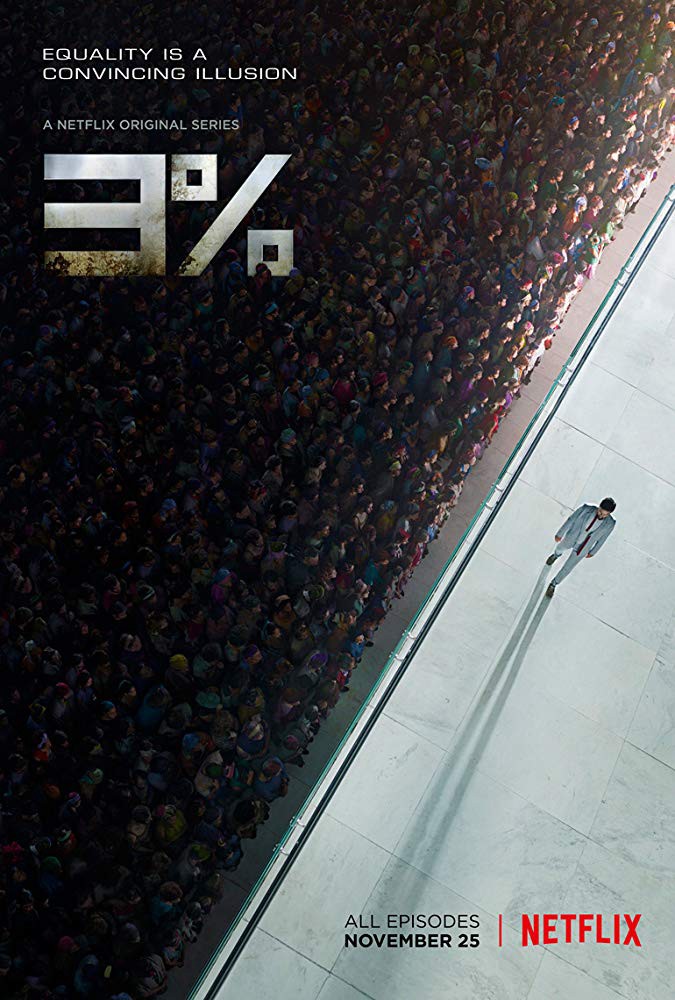3%- Some fairness is actually based on unfairness
🎬# secretly watches science fiction-3%
🏆IMDB 7.5/10 🏆Rotten Tomatoes 85%
Secret Score: 9⃣/10
💡What kind of people are suitable to watch this movie?
👉I want to watch a series from a non-European and American perspective
👉If you like utopian plots
👉You want to watch a realistic version of The Hunger Games?
"3%" is a Brazilian thriller science fiction series (Two seasons in total | 10 episodes per season | approximately 50 minutes per season)
The background is that 97% people are trapped in the barren "inland", and everyone at the age of 20 has a chance to go to the high-tech, perfect "offshore" life through selection, but every year only 3% Only the selected superior population can reach "an almost perfect utopia" offshore and live a completely different life...
Some fairness is actually based on unfairness
The background is set in the country of Brazil,3%The issue of the gap between rich and poor in Brazil runs deeply throughout the entire series, and this selection is not likeHungry GamesYour grades are still determined by life and death, but in a way that is closer to life, such as interviews to confirm motivations and various tests to find out whether candidates have the characteristics that suit offshore. The most touching thing is that these tests are like various selections in our real life. Sometimes you have no way to understand the scoring standards, and you have even witnessed candidates who advanced because of their cleverness or cheating, but there is nothing you can do about it. , this brings up a very important concept. In fact, many selection criteria are not open and transparent at all. Perhaps the director wants to use this series to illustrate that "some fairness is actually based on unfairness."
This series is mainly about explainingHow the recruitment motivations of different people are affected by their respective growth backgrounds, thus creating such a wonderful and intriguing selection process. Most people want to live a better life, but some people want to completely change this selection system, so they become spies and want to completely destroy this system from the inside. The spy-on-spy mentality combined with this makes people sweat. The selection process makes the entire album very compact.
Non-mainstream strives to reform the system under mainstream thinking
The most interesting thing is that people who oppose the selection system formed a resistance organization called "Target". They oppose this dichotomous selection method and believe that it should not be so dichotomous and that the selection system should not trample on those who may actually be very vulnerable. The self-esteem of someone who is excellent but failed in the selection process.
What I like very much is those plots that I thought I had mastered during the viewing process, but they managed to overwhelm me at several points. By constantly flipping the plot, I achieved a higher level of viewing enjoyment! I am also amazed at the complete connection between the establishment of the entire worldview and the main branch line.
In addition, I was very moved by the fact that the heroine was the target from the beginning until she was not influenced by her brother and devoted herself to doing things for a better world. In the process, her ideas were interfered with by many factors, but in the end she was not affected by her brother's influence. Or return to the purest and kindest ideas in your heart.
Summarize
I personally highly recommend this Brazilian film series 3%, although it is an old Utopia series, and I originally thought it was the action scenes that win the show, but 3% mainly focuses on carefully observing the selection process and everyone's motivations, and based on these motivations to create a spy-on-spy, breathtaking and compact plot.
3% sets everyone at the same starting point. Everyone comes from the slums, and family background cannot add points to your selection process.
Not only brings the issue of the huge gap between rich and poor in Brazil (inland vs. offshore), but also discusses it in depthThe gap between rich and poor(Or it is more appropriate to say superior and inferior people) Is this destined to be like this? If you fail to pass such a selection, does that mean you are doomed to be a low-level failure? But in fact, many selection criteria are not open and transparent at all. Maybe the director wants to explain through this series"Some fairness is actually based on unfairness.". This is the mainstream idea in the film, and there are also "target" rebel groups working hard to resist such mainstream pedantic ideas, trying to make some reforms to the existing system that is deeply rooted in the hearts of the people!
The difference between 3% and real life is that 3% emphasizes the efforts of nurture in the selection process, and the influence of nature is not big; unlike in real life, it is the influence of nature plus nurture that is stacked up. Looking at the protagonists in the film working so hard to reform the system, in real life we may find it more difficult to overthrow the existing system due to innate limitations, but we may also be able to learn this spirit and do it for ourselves. Fight for what you think is right and try to make some changes!


